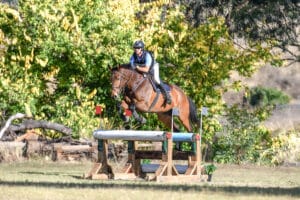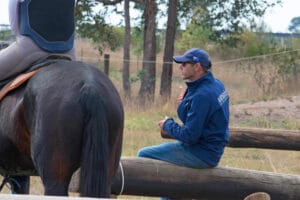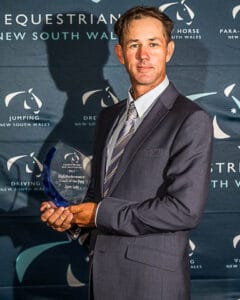Sam Lyle, a 5* eventer and EA Level 3 Coach with a Masters of Education in Sports Coaching, spoke recently about his award-winning career as a coach.
Sam Lyle got into horses in his early teens and was a self-described horse nut from then on. “I’d go down to the family farm as much as I could on the weekends and holidays. When I left school I rode full-time, working for a few different people,” he recounts. At the time, he was neighbours with eventer and high level EA coach, Simon Kale, who played a big part in getting him into eventing and bringing him up through the ranks. Sam even bought one of Simon’s horses, which ultimately took him all the way up to 5* eventing.

Sam and Harry Hill took 3rd place in the 2* at Quirindi in April (Image by Britt Grovenor Photography)
Eager to pursue a career with horses, Sam saw coaching as a way to fund his endeavours. “Living across the road from Simon had a big influence on me early on in my career. I was always very aware that I needed to pay for the horse riding and because Simon was into the coaching program, I saw that as a way to make a living.” He wasted no time, completing his Equestrian Australia (EA) Level 1 coaching exam his first year out of school. As a coach, rider and trainer, Sam recognises that he has evolved over time, and that the amount and type of coaching he did was quite different early on. Now, coaching makes up a part of his business, alongside riding his own competition horses and schooling clients’ horses.
Coaching vs teaching
Teaching entails directing a rider to carry out a specific set of tasks, which is important when first developing a new skill or technique. “I’ll give the rider a particular set of directions, for example, and get them to ride to a jump the way I ask,” Sam explains. The benefits of a methodical step-by-step instructional approach – ride this line, jump these three fences and get five strides in – helps the student to understand and learn how to do something new.

Coaching has been a big part of Sam’s life throughout his career
A truly successful coach, however, also helps the rider to continue to grow and improve, even when the coach isn’t present. Sam talks about teaching his students to self-coach: “I try to always encourage the rider to self-assess by asking them questions. How did that speed feel coming into the jump? Do you think you were straight?” Other times he opts to not even guide the question that much, but rather encourages the rider to analyse their own attempts. “I might say: OK when you come into that jump again, what do you think you could improve? Then they have to go, ‘Oh I didn’t quite get straight there’, or ‘I was a bit too fast’, or ‘I was too slow’. I’m trying to get them to ask themselves a little bit.”
Sam adjusts his coaching style to suit the development stage of the student and where he thinks they’re at, relative to the situation they’re in. “If it’s a group situation, versus a clinic, versus someone I coach a lot, it will change to some degree,” he says. His ultimate goal is to get riders to understand when a certain aspect has been good or bad and what made it that way. He believes the days of coaches yelling and screaming ‘you’ve got to get over that jump!’ and ‘make the horse do it!’ have passed, rather he tries to present as a calm coach: “The research shows that people learn better by making their own mistakes and then assessing what happened, so you do want to channel into that.”
Another aspect Sam focuses on is encouraging the rider to be happy with the level they’re at. “Most people I coach are doing the sport for enjoyment and fun. It’s OK to stay at the level you’re enjoying, don’t feel pressured to go up.”
Extra benefits
One of the biggest challenges he has encountered as a coach is finding balance. “In general, trying to balance everything, as far as coaching, my own riding, family, life, just trying to fit everything in, that can be a challenge,” Sam remarks. Every day he rides anywhere from 10 to 13 horses, as well as giving a couple of lessons, and it all takes time.
But he has also found that coaching others has a great payoff: it helps advance his own riding. “When you’re coaching you need to try and break the processes down to get a really clear message on what will help the horse improve,” he explains. After getting home from coaching, Sam reflects on moments when he’s explained to a rider that if they do a particular exercise well, it will help their horse perform better – and that encourages him to go and work on it with his own horses.
The approach of figuring out exactly what you’re doing on the horse as a rider, combined with the perspective of having watched it executed from the ground, can amplify all the moments during that process you need to be aware of, providing a more complete picture. “Coaching has absolutely helped my riding,” he says.

Receiving the award for 2017 Equestrian NSW High Performance Coach of the Year
Wisdom for aspiring coaches
Aside from completing the EA coaching program right the way through to a Level 3 Eventing Specialist, the highest EA coaching accreditation available, Sam believeshis coaching has evolved through watching other people, having lessons himself, and being taught by coaches he respects.
The very act of coaching has also developed and progressed his style over the years and, in the same way he encourages his riders to ask questions of themselves, Sam readily self-analyses his own coaching. “I’ll do a clinic and at the end of every group I’ll think to myself, did I handle that situation well? For example, if I’ve had a horse that’s been stopping at a cross country jump, I’ll ask myself what I could have done differently. Did I not give the horse enough of a warm up at similar but smaller versions of the jump? Could I have handled the way it was stopping differently? Just constantly asking myself questions about how I could have improved a session, and I try and take that forward to the next session.”
For anyone keen to venture down the coaching pathway, Sam highly recommends embarking on the EA program. “Every time I teach a lesson, I still use fundamentals I learnt doing the EA Level 1. I do think that’s a really good starting place for anyone setting out to become a coach.” He also recommends watching coaches you respect, so you can see how they plan and structure their lessons, and hear what they have to say.
Finally, Sam suggests an excellent way to learn is to go down to your local Pony Club and volunteer (after first checking on insurance requirements). “I’ve found the biggest thing that has helped me coach, is coaching. Pony Club is a really good way to start, so get in and have a go.”
Hear the full conversation, including a discussion on nerves and Sam’s tips for using them to your advantage, at Equestrian Hub.
Feature Image: Sam and BF Valour went on to win the 2022 Quirindi Eventing 4* (Image by Britt Grovenor Photography)



